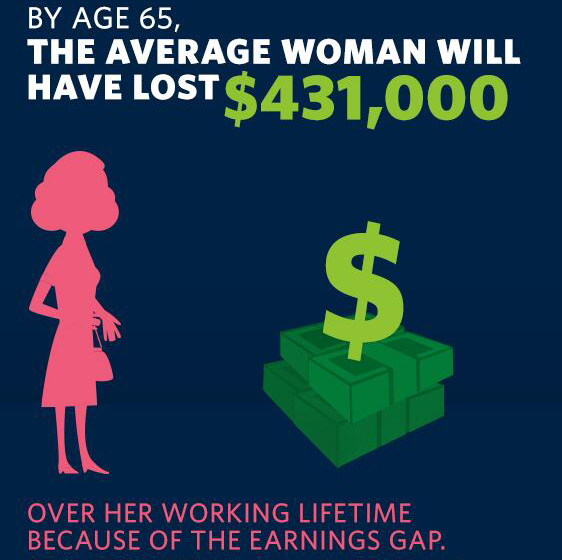 Women and families in Washington and around the nation continue to struggle under an unflinching gender wage-gap. Today, on Equal Pay Day, let’s reflect on what the wage gap means for Washington women and families and what we can do here at home to make a better world for our daughters.
Women and families in Washington and around the nation continue to struggle under an unflinching gender wage-gap. Today, on Equal Pay Day, let’s reflect on what the wage gap means for Washington women and families and what we can do here at home to make a better world for our daughters.
Women in Washington earn 78 cents for every man’s dollar. That’s over $11,000 a year in lost earnings. For women of color, it’s even worse. On average, African American women are paid 64 cents and Latinas are paid 54 cents for every dollar paid to white men.
According to the National Partnership for Women and Families:
On average, Washington women who are employed full time lose a combined total of approximately $10,191,456,788 every year due to the wage gap.Families, businesses and the economy suffer as a result. These lost wages mean families have less money to spend on goods and services that help drive economic growth.
For example, if the wage gap were eliminated, on average, a working woman in Washington would have enough money for approximately:
• 82 more weeks of food for her family (1.6 years’ worth);
• Seven more months of mortgage and utilities payments;
• 12 more months of rent;or 3,265 additional gallons of gas.
Most wage-gap measurements are based on earnings of full-time, year-round employees only, excluding many hourly service jobs as well as people who “voluntarily” work part time for family-care or other reasons. If we factor in those workers and look at 2013 economic data, Washington women took home 61% of men’s average monthly wages according to analysis from EOI.
There is some good news. Today, President Obama issued an executive order prohibiting federal contractors from retaliating against employees who share compensation information. And this week the Senate will vote on the Paycheck Fairness Act – groundbreaking legislation that would protect a worker’s right to share information about their pay with colleagues in order to learn if employees are receiving equal pay for equal work.
We can’t afford to wait for D.C. to take action. In Washington, we can lead the nation on equal pay and pass a state version of the Paycheck Fairness Act. Cities like Seattle are championing equal pay practices at the local level – looking at pay bias in historically gender-segregated roles like administrative work, strengthening the city’s minimum wage and universalizing city employee parental leave policies.
But the wage gap is more complex then what women see on their pay stub. Our laws still assume that every household has a full-time caregiver at home despite women making up half of the nation’s workforce and nearly half of family breadwinners. State-based policies like Family and Medical Leave Insurance and Paid Sick Days ensure that women and their families can navigate the predictable booms and busts of life and family – welcoming a new child, caring for a sick and aging parent or a sudden medical emergency. Both FMLI and paid sick leave are working in cities and states across the country – positively impacting business and families.
Celebrate Equal Pay Day by talking to your family, neighbors, lawmakers and candidates about why policies that support working women and families are important to you.
Let’s get to work.
More To Read
September 10, 2024
Big Corporations Merge. Patients Pay The Bill
An old story with predictable results.
September 6, 2024
Tax Loopholes for Big Tech Are Costing Washington Families
Subsidies for big corporations in our tax code come at a cost for college students and their families
July 31, 2024
News from the Road: EOI’s summer policy road trip continues
We're working to understand the issues that matter to Washingtonians
